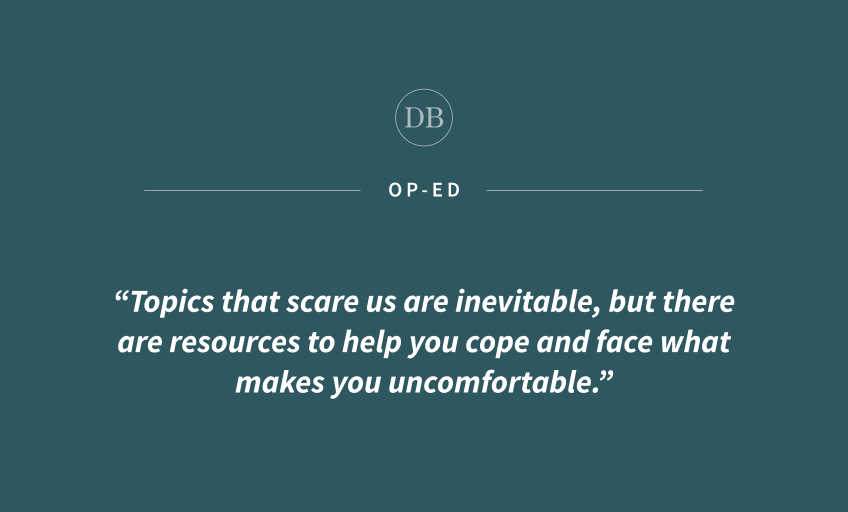Op-ed: Providing resources can help to acknowledge, process sensitive media

By Alex Antenen
Feb. 7, 2023 8:10 p.m.
Editor’s note: This article contains mentions of suicide that may be upsetting for some readers.
Every day on the way, to class I see an advertisement at one of the bus stops near Ackerman Union. It broadcasts a jarring statistic: “63 people die by gun suicide every day.”
Every time I pass it, I get chills.
Mental health is a stigmatized and triggering topic for just about everyone. While I have never asked the people sitting next to me at the bus stop about their opinions on the ad, I am sure it stirs up some sort of reaction in them too.
I spent much of high school dealing with thoughts of taking my own life – and even attempting it once. To this day, it is a night I still struggle to make sense of. The ad I pass on my way to morning lectures brings up new and old emotions all at once, but perhaps more importantly, it makes me consider the importance of how our media discusses difficult but relevant issues.
Different forms of media will commonly provide disclaimers or “trigger warnings” before detailing topics such as sexual violence, eating disorders and suicide. I often see my professors including such warnings when their lectures contain these subjects.
It is, of course, essential to acknowledge triggers in media to ensure those who are not mentally equipped to process certain issues have the ability to opt out. But I think there is something missing from these warnings – what to do if you’re triggered. You can always simply refuse to consume the media or walk out of a lecture – and in many cases, this is often encouraged. However, that isn’t truly an effective solution.
Why are we leaving those affected by the warnings out of the conversation?
The point of including these warnings is to be more inclusive, but instead, they do the opposite. By not providing a way to safely process triggering media, already alienated groups become even more alienated. There must be an option in which we acknowledge that the material may be challenging to deal with, yet work to provide resources for any affected individuals who want to consume said media.
Among several options, resources such as the Crisis Text Line, which connects individuals to a trained counselor who has experience working through the emotions of being triggered, and the 988 Suicide and Crisis Lifeline, which is a hotline for those in emotional distress, can provide in-the-moment support.
Prior to realizing that services such as the Crisis Text Line and 988 Suicide and Crisis Lifeline existed, I was completely unable to talk about suicide and other usually delicate issues. But, receiving the training to process what triggers us has been incredibly rewarding.
As someone who was previously left out of the conversation, I am no longer afraid to talk with others about my experiences. I am able to talk to someone about suicide and be unafraid of spiraling.
It thus becomes extremely crucial to empathetically provide resources for those who may be impacted by the discussion of sensitive topics.
Topics that scare us are inevitable, but there are resources to help you cope and face what makes you uncomfortable.
Alex Antenen is a first-year neuroscience student at UCLA.



